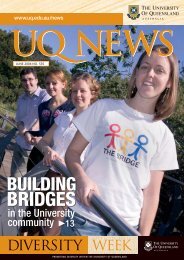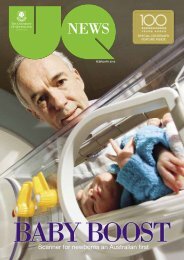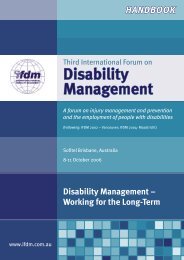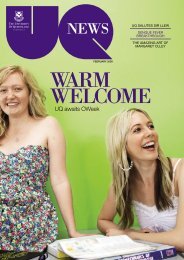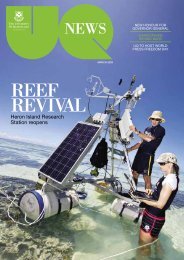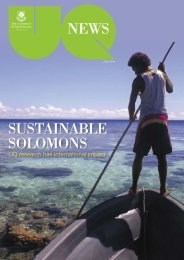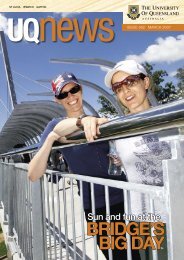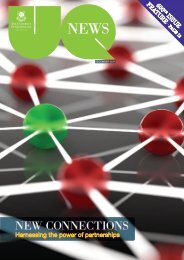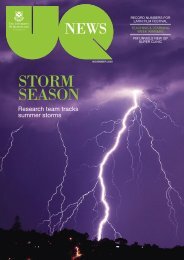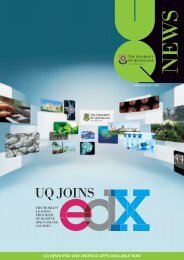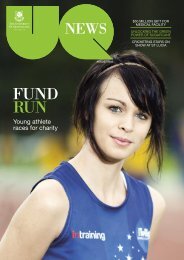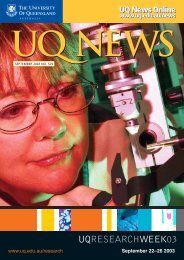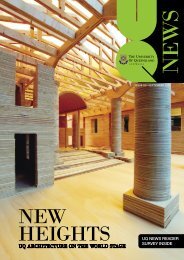01 cover - Office of Marketing and Communications - University of ...
01 cover - Office of Marketing and Communications - University of ...
01 cover - Office of Marketing and Communications - University of ...
Create successful ePaper yourself
Turn your PDF publications into a flip-book with our unique Google optimized e-Paper software.
SITE LEARNING<br />
Engineering<br />
flexibility<br />
The challenge was to find a way<br />
for UQ engineering undergraduates<br />
to gain more meaningful<br />
industry experience without<br />
extending the length <strong>of</strong> study or<br />
altering the academic st<strong>and</strong>ards<br />
in the degree program.<br />
Pr<strong>of</strong>essor<br />
Radcliffe<br />
What emerged was the Undergraduate<br />
Site Learning Program,<br />
enabling final-year students to<br />
manage their learning <strong>and</strong> assignment<br />
objectives while working in a<br />
pr<strong>of</strong>essional setting.<br />
Team leader Pr<strong>of</strong>essor David<br />
Radcliffe said USLP is a workbased<br />
learning program that<br />
enables final-year students to<br />
simultaneously consolidate their<br />
technical knowledge, enhance their<br />
problem formulation <strong>and</strong> solving,<br />
communication <strong>and</strong> teamwork.<br />
As part <strong>of</strong> their engineering<br />
degree, undergraduates must gain<br />
60 days’ industry experience but<br />
this work is getting harder to<br />
arrange, is subject to economic<br />
fluctuations <strong>and</strong> the quality <strong>of</strong> the<br />
experience varies.<br />
Other means <strong>of</strong> gaining industry<br />
experience, by having co-operative<br />
work placements in which students<br />
spend 6-12 months in industry during<br />
their studies, extend the degree<br />
program <strong>and</strong> are not connected<br />
directly to the <strong>University</strong> program.<br />
The new USLP option aligns<br />
the final-year thesis <strong>and</strong> assignment<br />
work to “real” work, <strong>and</strong> gives<br />
students full academic credit for<br />
their placement without extending<br />
the duration <strong>of</strong> degrees.<br />
PROGRAM EVOLUTION<br />
Blend for changing needs<br />
Modern, innovative <strong>University</strong><br />
<strong>of</strong> Queensl<strong>and</strong> programs are<br />
unlocking research possibilities<br />
<strong>and</strong> opening employers’ doors.<br />
Courses that did not exist 10 years<br />
ago have become de rigeur for<br />
students keen to hit the ground<br />
running in the working world. Among<br />
these multi-dimensional courses on<br />
<strong>of</strong>fer at UQ are: computational<br />
biology (combining IT, biology <strong>and</strong><br />
maths); biotechnology (biological <strong>and</strong><br />
chemical sciences <strong>and</strong> law); <strong>and</strong><br />
information environments (design,<br />
architecture <strong>and</strong> IT).<br />
Director <strong>of</strong> the Tertiary Education<br />
Institute Denise Chalmers said while<br />
interdisciplinary teaching was not<br />
new, programs were now moving well<br />
outside traditional subject blends.<br />
“There is a new conceptualisation,<br />
a new approach. The undergraduate<br />
programs have been deconstructed so<br />
that if you were looking at, say,<br />
evolution from a science viewpoint,<br />
you would now look at evolution in<br />
terms <strong>of</strong> its biology, its chemistry <strong>and</strong><br />
its sociology,’’ she said.<br />
Lecturer in Higher Education, Dr<br />
Catherine Manathunga, is the chief<br />
investigator <strong>of</strong> a UQ-funded scoping<br />
Denise Chalmers<br />
study into interdisciplinary research<br />
education <strong>and</strong> staff development at<br />
the <strong>University</strong>. Co-investigators<br />
include Associate Pr<strong>of</strong>essor Paul Lant<br />
from the Advanced Wastewater<br />
Management Centre <strong>and</strong> Dr George<br />
Mellick from the Southern Clinical<br />
Division <strong>of</strong> the Medical School.<br />
Part <strong>of</strong> their research involves<br />
study at a UQ research centre, the<br />
Advanced Wastewater Management<br />
Centre, that is keen for students to<br />
have interdisciplinary research<br />
experience.<br />
Microbiologists <strong>and</strong> chemical<br />
engineers are sharing their knowledge<br />
to find solutions to wastewater<br />
problems.<br />
Pr<strong>of</strong>essional Internship Program<br />
(PIP) for UQ International Students<br />
A collaborative initiative between the Institute <strong>of</strong> Continuing & TESOL<br />
Education (ICTE-UQ) <strong>and</strong> Australian Internships (AI) <strong>of</strong>fers UQ international<br />
students a unique opportunity to undertake fulltime pr<strong>of</strong>essional internships<br />
during semester breaks or on completion <strong>of</strong> studies:<br />
Gain valuable work experience in your chosen area <strong>of</strong> study<br />
Enhance your career opportunities<br />
Internationalise your resume/CV<br />
Experience an Australian pr<strong>of</strong>essional working environment<br />
Receive pr<strong>of</strong>essional training, a work report <strong>and</strong> reference<br />
Further information on the Pr<strong>of</strong>essional Internship Program (PIP) can be<br />
obtained through: Institute <strong>of</strong> Continuing & TESOL Education (ICTE-UQ),<br />
The <strong>University</strong> <strong>of</strong> Queensl<strong>and</strong>, St Lucia Qld 4072 Australia<br />
Phone: (07) 3365 6565 Fax: (07) 3365 6599<br />
Email: pip@icte.uq.edu.au Web: www.icte.uq.edu.au<br />
INSTITUTE OF CONTINUING AND TESOL EDUCATION<br />
TEACHING AND LEARNING WEEK 2002<br />
OVERSEAS STUDY<br />
Broad view<br />
from abroad<br />
An increasing number <strong>of</strong> UQ<br />
postgraduate students are<br />
joining the long list <strong>of</strong><br />
undergraduates taking the<br />
opportunity to study overseas as<br />
part <strong>of</strong> their degree.<br />
Run by the International<br />
Education Directorate (IED), the UQ<br />
Abroad program has student<br />
exchange agreements with almost 100<br />
institutions in more than 20 countries.<br />
“Although the exchange program<br />
is mainly for undergraduate students<br />
we are seeing a growing number <strong>of</strong><br />
postgraduates interested in studying<br />
at one <strong>of</strong> our partner institutions for<br />
one or two semesters,” said Exchange<br />
Student Advisor Jan McCreary. “For<br />
example, Master <strong>of</strong> Business Administration<br />
(MBA) students can attend<br />
Tulane <strong>University</strong> in the US, the<br />
Norwegian School <strong>of</strong> Management,<br />
the National <strong>University</strong> <strong>of</strong> Singapore,<br />
or if they speak Spanish, the Tec de<br />
Monterrey in Mexico.<br />
“It’s a fantastic opportunity for<br />
students. Not only can it broaden the<br />
scope <strong>of</strong> their degree by completing<br />
courses only <strong>of</strong>fered at the host<br />
institution, but the experience gives<br />
students a different perspective on<br />
their field <strong>of</strong> study <strong>and</strong> can help them<br />
dis<strong>cover</strong> new career <strong>and</strong> academic<br />
opportunities. It can also improve<br />
their foreign language skills, maturity<br />
level <strong>and</strong> independence.”<br />
In the past four years the number<br />
<strong>of</strong> UQ students opting for overseas<br />
study as part <strong>of</strong> an exchange program<br />
has risen by almost 155 percent.<br />
22<br />
UQ NEWS, DecEMBER 2002



